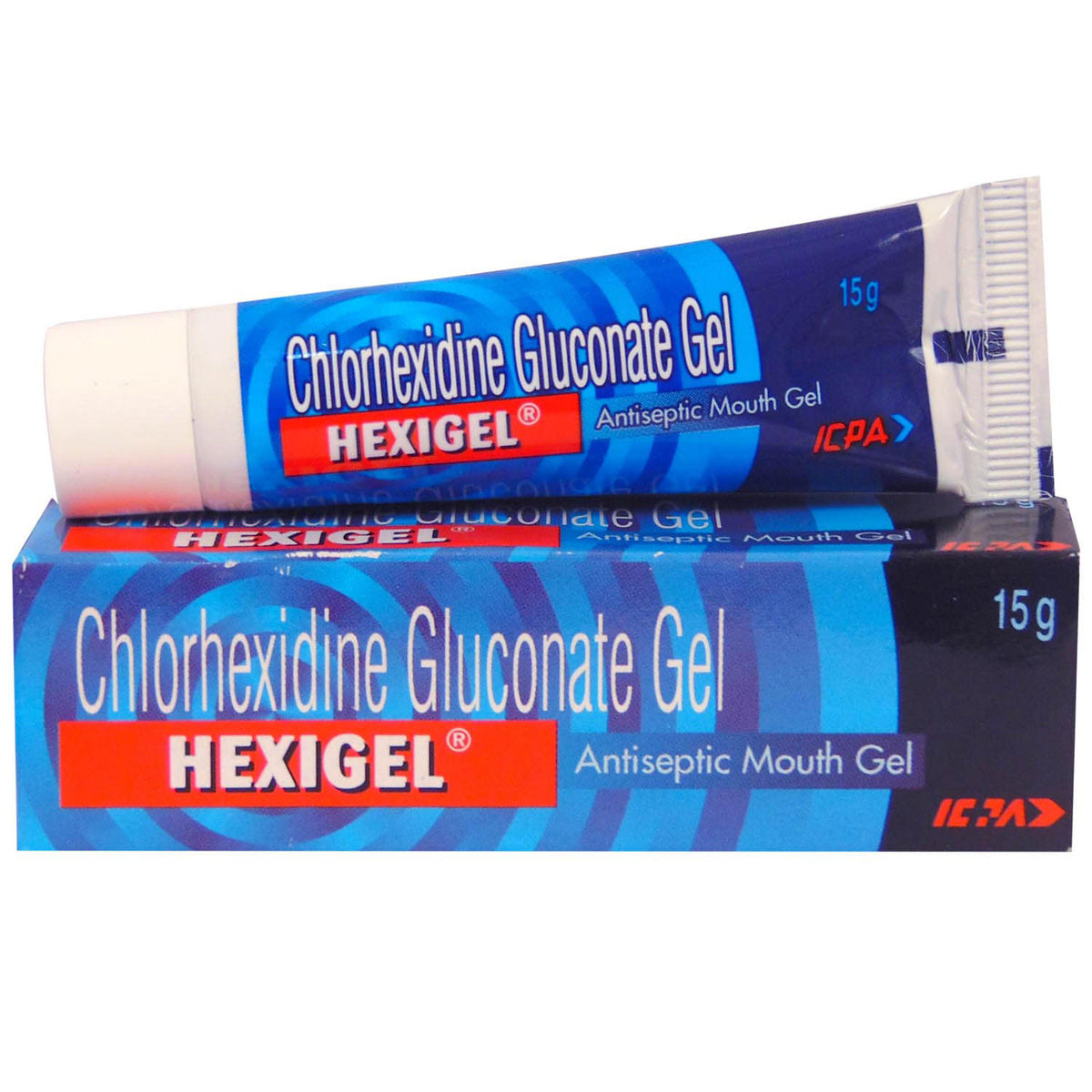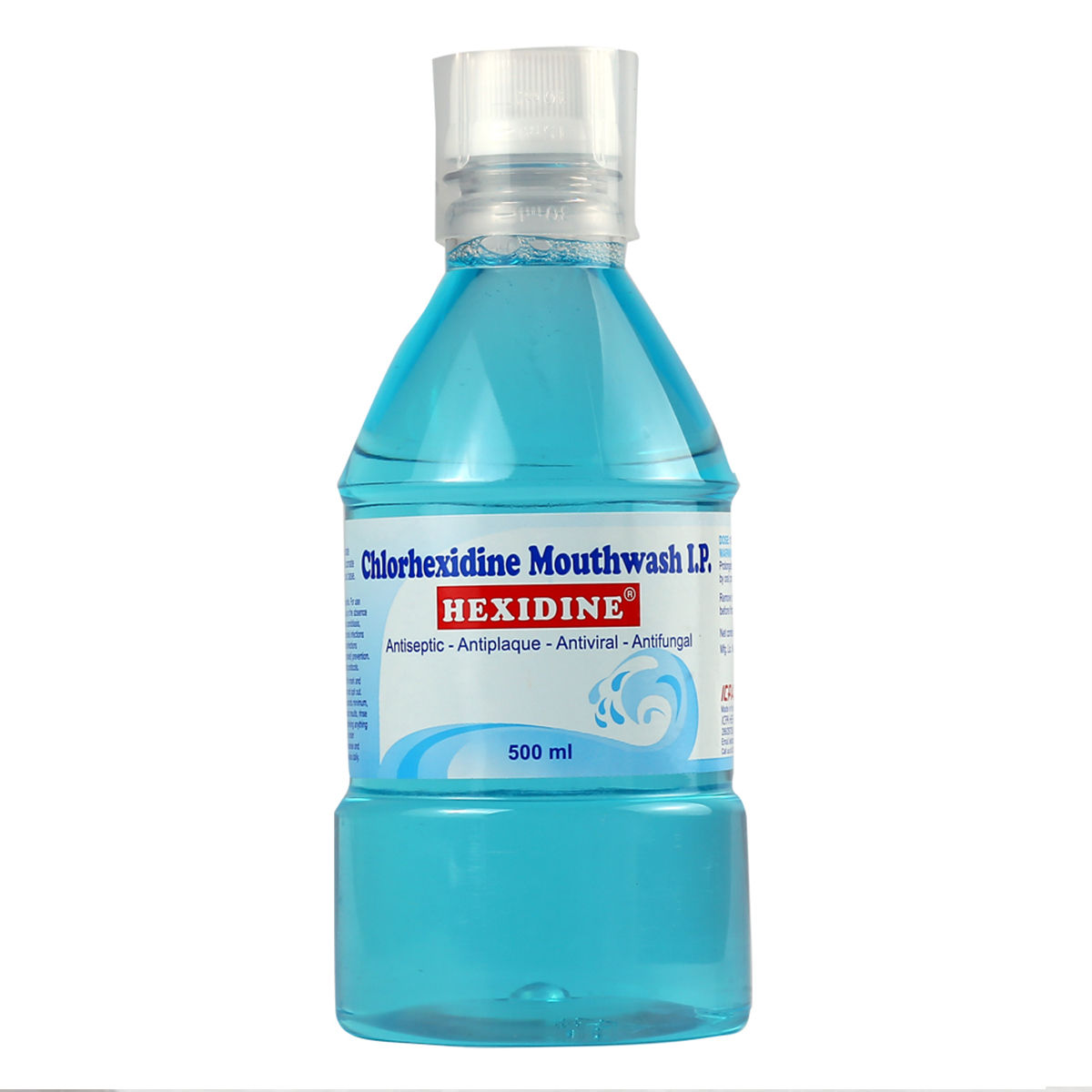Chlorhexidine Gluconate
About Chlorhexidine Gluconate
Chlorhexidine Gluconate is used to treat mouth infections, mouth ulcers and gum disease/inflammation (gingivitis). Mouth infections occur due to the overgrowth of bacteria in the mouth. Symptoms include swollen gums, bad breath, teeth sensitivity, and unpleasant taste changes. Gingivitis is a bacterial inflammation of the gums.
Chlorhexidine Gluconate contains chlorhexidine gluconate or chlorhexidine (an antiseptic). It works by destroying the bacteria that cause gum disease, tartar, and other illnesses in the mouth. As a result, it aids in the maintenance of proper dental and oral hygiene.
In some cases, Chlorhexidine Gluconate may cause common side effects like irritation, unusual or unpleasant taste in your mouth, dry mouth, and staining of teeth. These side effects do not require medical attention and will fade with time. However, you should seek medical attention if these side effects are persistent.
Please do not take Chlorhexidine Gluconate if you are allergic to any of its ingredients. Before using Chlorhexidine Gluconate, inform your doctor if you are pregnant, intending to become pregnant, or nursing. After using Chlorhexidine Gluconate, do not drink tea, coffee, or smoke for at least an hour. To maintain good oral hygiene, try to brush your teeth at least two times a day to avoid any oral infection and its spread.
Uses of Chlorhexidine Gluconate
Medicinal Benefits
Chlorhexidine Gluconate is used to treat infections in the mouth, including gingivitis (gum inflammation), dental plaque, denture stomatitis and thrush. Chlorhexidine Gluconate works by destroying the bacteria that cause gum disease, tartar, and other illnesses in the mouth. As a result, it aids in the maintenance of proper dental and oral hygiene.
Directions for Use
Storage
Side Effects of Chlorhexidine Gluconate
- Irritation
- Unusual or unpleasant taste
- Dry mouth
- Staining of teeth
Drug Warnings
If you are allergic to any of its constituents, do not use Chlorhexidine Gluconate. If you are pregnant or breastfeeding, notify your doctor. Do not give Chlorhexidine Gluconate to children unless advised by a doctor. After using Chlorhexidine Gluconate, do not drink tea, coffee, or smoke for an hour. Chlorhexidine Gluconate may cause staining of teeth, therefore, brush and floss daily. Avoid contact of Chlorhexidine Gluconate with eyes and nose. If contact occurs, rinse with water.
Drug Interactions
Drug-Drug interactions: No interactions found/established.
Drug-Food Interactions: No interactions found/established.
Drug-Disease Interactions: No interactions found/established.
Drug-Drug Interactions Checker List:
Safety Advice

Alcohol
cautionNo interaction was found/established. However, it is advisable not to take or limit alcohol as a precautionary measure.

Pregnancy
cautionNo harmful effects in human pregnancy have been reported. However, Chlorhexidine Gluconate should be used only when the benefit to the mother has been assessed by a healthcare professional.

Breast Feeding
cautionChlorhexidine Gluconate is probably safe to use during breastfeeding. However, consult your doctor if you have any concerns.

Driving
not applicableNo reported interactions were found/established.

Liver
cautionPlease consult your doctor if you have any concerns regarding the usage of Chlorhexidine Gluconate in patients with liver impairment.

Kidney
cautionPlease consult your doctor if you have any concerns regarding the usage of Chlorhexidine Gluconate in patients with kidney impairment.

Children
cautionChlorhexidine Gluconate should be given to children only if a healthcare professional recommends.
Habit Forming
Diet & Lifestyle Advise
- Regular dental exams can aid in the prevention of illness development.
- It is essential to get frequent dental check-ups to discover and address any issues with your teeth and gums as early as possible.
- Maintain adequate dental hygiene to prevent the transmission of infection.
- Mild forms of gum disease are frequently treatable by practising basic dental hygiene.
- Staining may be minimised by avoiding tea, coffee, red wine and brushing every day.
Special Advise
- Avoid consuming beverages for at least 1 hour after using Chlorhexidine Gluconate.
- Children under the age of 12 should not use Chlorhexidine Gluconate unless instructed to do so by a dentist or doctor.
Patients Concern
Disease/Condition Glossary
Mouth infections: Mouth infections occur due to the overgrowth of bacteria in the mouth. Symptoms include swollen gums, bad breath, teeth sensitivity, and unpleasant taste changes.
Gingivitis: It is a periodontal or gum disease with swollen and bleeding gums caused in response to bacterial biofilms (also called plaque) that is attached to tooth surfaces. If left untreated, it can lead to periodontitis and, eventually, loss of teeth. Its signs and symptoms include bleeding from gums, swollen gums, a loose tooth and sometimes foul oral smell. Fusobacterium, Lachnospiraceae, Lautropia, Prevotella oulorum, and Rothia dentocariosa are some harmful bacteria that cause dental and gum problems.
Denture stomatitis: Denture stomatitis (also known as oral stomatitis) is a fungus (yeast) infection caused by candida. It's very normal to have some candida in your mouth. However, candida can overgrow and cause a fungal illness when there is an imbalance. Stomatitis caused by candida is also commonly referred to as thrush.
FAQs
Chlorhexidine Gluconate belongs to the class of medication called oral antiseptic and disinfectant agents used to treat mouth infections, mouth ulcers and gum disease/inflammation (gingivitis).
Chlorhexidine Gluconate works by destroying the bacteria that cause gum disease, tartar, and other illnesses in the mouth. As a result, it aids in the maintenance of proper dental and oral hygiene.
Gum disease is caused by plaque build-up on the teeth. Plaque is a bacterial-infested sticky substance. Some bacteria in plaque are harmless, but others are hazardous to your gums' health. Plaque builds up on your teeth and hurts your gums if you do not brush them. This might result in redness, bleeding, oedema, and pain.
After using Chlorhexidine Gluconate, avoid eating, drinking, or brushing your teeth for 30-60minutes.
Yes, Chlorhexidine Gluconate may cause staining of teeth if taken for a prolonged time. However, the staining may not be permanent and might disappear after discontinuation of Chlorhexidine Gluconate. To avoid staining, brush and floss your teeth every day.
Although there is very little information on the safety of Chlorhexidine Gluconate during pregnancy, it's generally OK to use it; it is not considered harmful.
In some cases, Chlorhexidine Gluconate may cause common side effects like irritation, unusual or unpleasant taste in your mouth, dry mouth, and tooth staining. These side effects do not require medical attention and will fade with time. However, you should seek medical attention if these side effects are persistent.
Use Chlorhexidine Gluconate for 2-4 weeks only or as instructed by the healthcare professional based on a medical condition.
Yes, bad breath (Halitosis) can be reduced using Chlorhexidine Gluconate. Chlorhexidine is effective at reducing bad breath (halitosis) because it is bactericidal and bacteriostatic against various kinds of bacteria.
For best results, use Chlorhexidine Gluconate after you have brushed and flossed your teeth. Take the advised amount of the liquid into the mouth, swish for a minute, and spit out. Do not swallow.
Do not rinse your mouth with water immediately after using Chlorhexidine Gluconate, as this will increase the bitterness. Rinsing may also decrease the effect of the Chlorhexidine Gluconate.
No, most manufacturers and dentists advise spitting the rinse out after use rather than swallowing it.
Although you are meant to swish and spit mouthwash, consuming a mouthful is not harmful. If you consume a high amount, you may get alcohol and/or fluoride toxicity. In such instances, go to the nearest hospital immediately.
Read labels carefully and follow the recommendations for use, being sure not to exceed the suggested amount or frequency.
Don't eat or drink for at least 30 minutes after using Chlorhexidine Gluconate. This allows the active compounds time to activate without being rinsed away.
Make sure to swish the mouthwash between your teeth and across your tongue. After swishing, thoroughly expel the mouthwash from your mouth and do not rinse with water. This allows the active substances to remain on your teeth longer.







